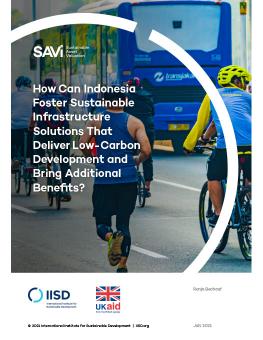
How Can Indonesia Foster Sustainable Infrastructure Solutions that Deliver Low-Carbon Development and Bring Additional Benefits?
The policy paper analyzes how Indonesia can foster sustainable infrastructure that delivers low-carbon development and bring additional benefits. It highlights the possible contributions of sustainable infrastructure for the national low-carbon development ambitions. The paper also provides guidance to policy-makers and decision-makers to identify the opportunities and benefits of sustainable infrastructure. Lastly, it presents ways to foster investments and leverage finance for sustainable infrastructure projects.
Participating experts
You might also be interested in
Sustainable Asset Valuation (SAVi) of a Small-Scale Tree Planting Initiative in Côte d'Ivoire
This report analyzes the social, economic, and environmental outcomes of a small-scale tree planting initiative at schools in Côte d'Ivoire.
IISD Annual Report 2023–2024
While IISD's reputation as a convenor, a trusted thought leader, and a go-to source on key issues within the sustainable development field is stronger than ever, the work happening outside the spotlight is just as valuable.
A Sustainable Asset Valuation of a Net-Zero Transport Strategy in Indonesia
This report presents the economic valuation of net-zero transport strategies in Indonesia—their investment costs, added benefits, and avoided costs—encompassing interventions such as investments in public transport, private vehicle electrification, teleworking, and decarbonization of the electricity supply.
A Sustainable Asset Valuation of the FAME II policy in India
This report presents the economic valuation of the second phase of the Faster Adoption and Manufacturing of Electric (& Hybrid) Vehicles (FAME II) policy in India and demonstrates its economic, social, and environmental outcomes under different scenarios.